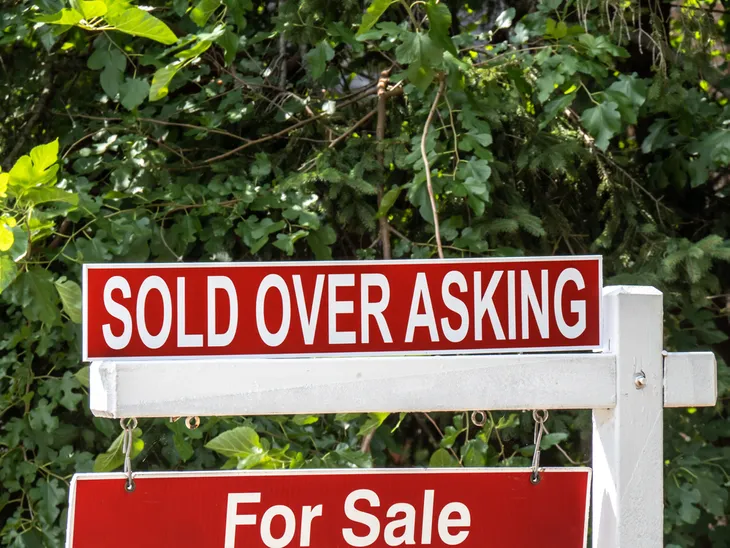Selling a house is a big deal. With home prices continuing to increase almost everywhere, it’s likely the biggest financial transaction you’ll make in your life. That’s why it’s never a good idea to just take the lazy approach to selling your home. Putting together a smart selling plan (versus a haphazard one) will make a huge difference in the financial gains your house will generate. Don’t you want to get the most of your largest asset? Here is a step-by-step guide on how to sell your house — from the moment you first start thinking about the possibility to having the money safely in the bank.
11. Hire a Real Estate Agent
A competent selling agent is worth every penny. They can be the difference between selling your home at a record price versus not selling a home at all. You want someone who is approachable and friendly, but great at negotiation. In some markets, certain agents will already have a whole list of possible buyers for your type of home ready.
Don’t just go with the popular choices for your neighborhood, either. Some agents are so busy that they won’t spend too much time on any one listing. Since they are so busy, they might end up pushing you to accept a less-than-stellar deal. On the other hand, popular agents are popular for a reason. There isn’t a one-size-fits-all solution. It’s really a balancing act. So trust your gut and go with someone you are comfortable with.
10. Mistakes To Avoid
Before we get too far into explaining all the things you should do in order to properly sell your house, let’s take a minute to talk about the things you shouldn’t do. We have an entire article devoted to these mistakes (which you should totally read too). However, here’s the short and sweet version.
You need to set a realistic price, remember those pesky additional costs, and be willing to negotiate. You also want to make sure you don’t take unflattering pictures or refuse to stage the home. These simple mistakes can bring down the purchase price of your home or cause it to waste away on the market while you wait for a dream offer that isn’t coming. Do yourself a favor and make sure to be exceptionally thorough in your plans to sell.
9. Figuring Out the Selling Price
As they say in real estate, there’s always a buyer somewhere — as long as the price is right. That’s why this is one of the most crucial steps of the whole entire process. In order to figure out how much you can reasonably ask for, you have to do some research. Take a look at similar homes in your area that are listed or recently sold. Since “location is everything” in real estate, you really want to focus on your immediate surrounding area. You can expand your research further, but it will become less relevant.
Check out the housing inventory available for sale right now to see what your competition looks like. You should also research any recently completed transactions, so you know what kind of offers are being made and accepted. If you’re planning to list at a higher price than your competition, you better have a solid reason. What makes your home worth the extra money? Price per square foot is important, sure. But so is location, curb appeal, condition of the house, layout, and recent repairs or remodels. Put yourself in the buyers’ shoes. Why would they pay more for your property compared to the one for sale on the next block?
8. Decide on the Pricing Strategy
Once you decide how much your home is worth, it’s time to figure out the dollar amount you want to put on the home listing. Amazingly, these are very likely to be two different numbers. Traditionally, realtors will tell you to list the home at a slightly higher price than what you are comfortable accepting. This creates a buffer to account for price negotiations. These days, though, there are bidding wars all over the country. The pricing process is now far more interesting (and volatile).
In a really hot market, consider listing your home at a lower than normal price. It will probably solicit multiple offers. The idea is that with a lower asking price, your house will attract more attention. It will then incentivize more people to put in bids. The increased competition will drive the bids up, getting you a higher price than if you just asked for more in the first place.
This strategy also tends to get homes sold more quickly. By now, pretty much everybody knows that this is the strategy most sellers are using. You’ll probably get plenty of offers at (or above) market value. Don’t worry about needing to accept an offer you aren’t comfortable with. You can always reject offers that come in too low.
7. Prepare Your Home for Sale
Most sellers want their home listed immediately when they decide to sell. However, I’ll bet that pretty much no home is really ready to be sold at that point. Before you do anything else, you need to make any necessary repairs before a single potential buyer walks in the door. So replace those leaky faucets, put in working light bulbs, and patch up drywall holes.
Next, you need to declutter. Then declutter some more, and declutter again. At the end of the day, you want your home to be showroom quality. No one expects to inherit a mess when they buy a home, but an untidy house isn’t likely to solicit many offers. So clean up all the kids toys and make sure everything looks as spotless as possible.
Consider refreshing your home with a new coat of paint as well. If you are using the same colors, you should at least touch up the dirty spots. Also consider painting the rooms with a neutral color. While that bright red wall might be your favorite thing ever, a neutral color will attract the most buyers. At the end of the day, that’s the most important thing now.
6. Strongly Consider Staging Your Home
Staging a house is really expensive, so be prepared. Not only will the designer charge an arm and a leg to let you rent the furniture for a short period of time, you’ll also have to find storage for your old furniture. You may even have to pay for moving the big pieces around.
Despite the extra cost, staging your home is highly recommended. Why do you think new construction homes routinely sell better than resell homes? Why do you think model homes ask for crazy prices and still find people willing to pay them? Buying a home is an important decision that has long term implications. However, it’s still a decision that’s heavily influenced by what people see in front of them. A buyer has to see themselves living in the space before they make an offer. A beautifully staged home helps them ease into the idea of owning it.
It’s also important to make sure the home is attractive both night and day. It’s amazing how many sellers neglect to look at their million-dollar listings at night, especially if they’ve already moved out. Buyers may not have time to check out your house in a really hot market. However, in normal housing markets, you can bet that they’ll come multiple times to make sure they are comfortable with the condition of the property before bidding on it. At the very least, make sure to have a look at the staging of your house once in the daylight and once in the evening.
5. Take Good Photos for the Online Listing
Nowadays, buyers are shopping for a home online well before they contact the seller’s agent. That’s why those pictures you put on your listing are extremely important. Any photos that are dim or blurry can deter buyers from even considering your property. Let’s face facts here. Your poorly lit smartphone photos aren’t going to cut it here. Hire a professional photographer for these. At the very least, let your real estate agent handle it.
You should consider including a brief video of your house too. If your budget allows it, a 3D home tour is even better. At the end of the day, the more ways you can get buyers to spend time looking at your listing, the better the chance they’ll fall in love with it. Your listing photos are basically your home’s first impression, so make it a good one.
4. Market the Home
Once you are finished editing all the media you’ve created, then it’s time to start marketing your property. Don’t just leave it up to the agent. The more ways you can promote your property, the higher the chances you’ll find that buyer. So post on your Facebook feed to let people know that you are selling and spread the word. Here are some ways you can promote your listing online.
- Get a website address and build a website for your property.
- Spread the word via postings on your social media accounts.
- Share your video of the property on YouTube.
- Use Facebook live to host virtual tours and for others to ask questions.
- Talk to your agent about COVID rules for open house and when it’ll be available.
Once your home has offers, then it’s time to consider the strongest offer. Don’t just pick the highest bid without considering anything else. Look at their source of funds. Can they pay cash? How are their finances? Are they pre-approved for a mortgage? Escrow dates are typically 30 days long. Are there any buyers who are willing and able to close in a shorter amount of time?
You should strongly consider submitting a counter offer too. The worst they can say is no, as long as your counter offer doesn’t offend them.
3. Prepare for All the Inspections and Negotiations During Escrow
You’ll have to make time for all the inspectors to come through. At the minimum, there will be a home inspection and others like termite inspection. If the buyer is borrowing money to buy your home, then an appraiser will be scheduled to walk through your property as well. Expect the seller agent to negotiate concussions after every inspection. For instance, buyers will ask for a list of repairs after the home inspections. You can deny all of them of course, but you’ll have to weigh the chances that they will drop out of a deal. So be reasonable and gauge the temperature during your negotiations.
Likewise, the buyer may ask for a lower price if the appraiser comes back to say that the home isn’t worth as much as the buyers were originally willing to pay. Since the appraiser’s assessed value of your property will directly affect how much the buyers can borrow, sometimes buyers are asking for a price reduction because that’s all they could afford.
Therefore, it’s really important that you treat the appraiser’s appointment just like any potential buyer showings. This means turning on all the lights, opening the windows (or the A/C) so the temperature is comfortable and cleaning up before the meeting.
Don’t forget to make sure that the seller’s agent is there during the meeting as well so he or she can point out all the positives of the property.
2. Don’t Ignore Escrow’s Emails
Send escrow all the documents they require so there are no delays in getting your money. They will probably ask you to fill out a bunch of forms during the process. Some forms are needed for tax reporting purposes. Others are there to get your bank information, so they know where to wire the proceeds to. Of course, they can’t send you money if you don’t give them your bank information. They probably won’t release the funds to you unless you fill everything out perfectly. They may be required by the IRS to withhold some funds for tax purposes.
Don’t be afraid to reach out to the escrow officer if you have any questions on how to fill out any of the forms they send you. They are being well compensated to help. The paperwork is a boring — but very important — part of the whole process. In order to make sure everything goes smoothly (ie, that you get your money), don’t neglect this step.
1. Look Through the Estimates in the Escrow Documents
Once escrow is moving along and you’re in the final stretch, you will get an estimate of what the closing statement will look like. Run through every line item on the estimate and question every expense. Make sure you know exactly how much the escrow company is charging you, how much will go to the agent, and what every expenses is. Double check the math on which money that will go to the lender and what will go to you.
If there are any discrepancies, now is the time to bring them up. When I recently sold my home, the escrow company shadily added a bunch of notary charges and mailing fees — even though everything was done online. Who knows how many people they fleeced because no one took the time to look?
 Shutterstock
ShutterstockThe Bottom Line
Selling your home can be stressful. After all, it’s probably a lot of money on the line. Not only that, but there’s often a big emotional element to saying goodbye to your previous home. Maybe it’s where your relationship started or your children took their first steps. These sentimental feelings are normal. But remember, at the end of the day, it’s just a building. You and your family can grow and make new memories anywhere.
Unless you’re an experienced house seller, we definitely recommend hiring professionals. That means picking a real estate agent, getting your home professionally staged, and using a pro photographer to capture it all. When all is said and done, you can sit back and relax with the sale money safely in your bank account. The last step is simple: take a few days off and relax. Selling a home can be exhausting and emotional. You’ve earned it!














